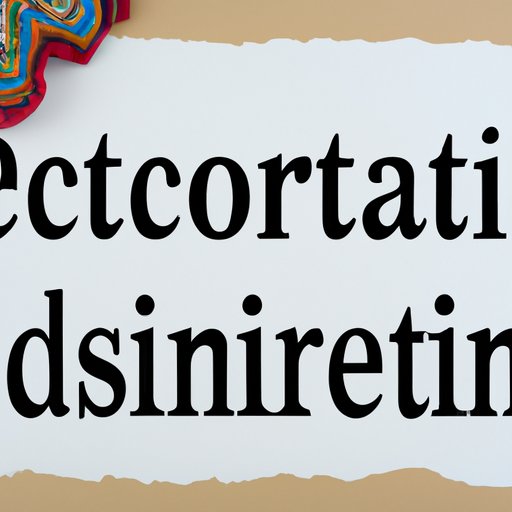Introduction
Cultural appropriation is a term used to describe when one culture adopts elements from another culture without permission or acknowledgement of its origin. This has been happening for centuries, as cultures have interacted with each other and borrowed elements from one another. However, in recent years, there has been an increased focus on the impact of cultural appropriation on racial equality. In this article, we’ll explore the debate around cultural appropriation: Is it racist?
Exploring the Debate Around Cultural Appropriation: Is It Racist?
The debate around cultural appropriation is complex and multifaceted. On one hand, some argue that cultural appropriation is not necessarily a bad thing, and can even be seen as a form of flattery or cultural exchange. On the other hand, many people believe that cultural appropriation is harmful and perpetuates racism by allowing privileged groups to profit from and exploit minority cultures.

Examining Arguments for and Against Cultural Appropriation
Proponents of cultural appropriation often argue that it is a form of cultural exchange and should be celebrated, rather than criticized. They contend that cultural appropriation is simply a natural part of cultural evolution, and that all cultures are constantly borrowing from one another. Furthermore, they argue that cultural appropriation allows people to express themselves, and can even be seen as a form of flattery.
However, opponents of cultural appropriation point out that it often occurs without proper acknowledgement or recognition of the original culture. They argue that this erases the history and experiences of minority cultures, and reinforces existing power dynamics that favor dominant cultures. Furthermore, they contend that cultural appropriation often serves to exoticize and commodify minority cultures, thereby allowing privileged groups to benefit from and exploit them.

Analyzing How Cultural Appropriation Can Perpetuate Racism
At its core, cultural appropriation is a form of cultural dominance. While some may view it as harmless or even beneficial, it ultimately reinforces existing power structures and inequalities, which can lead to further discrimination and marginalization of minority cultures. Additionally, cultural appropriation can perpetuate racism by normalizing stereotypes and misconceptions about minority cultures, and by denying them control over their own representation and identity.

Examining the Pros and Cons of Cultural Appropriation
It is important to consider both the benefits and harms of cultural appropriation. On the one hand, cultural appropriation can bring cultures together, allow people to express themselves, and create opportunities for mutual understanding and appreciation. On the other hand, it can also cause harm by reinforcing existing power dynamics, leading to further marginalization of minority cultures, and denying them control over their own representation.
Understanding How Cultural Appropriation Affects Minority Groups
It is also important to consider how cultural appropriation affects minority groups. Cultural appropriation often involves power dynamics that favor dominant cultures, which can lead to further marginalization and oppression of minority cultures. Additionally, it can deny minority cultures control over their own representation and identity, and can result in the commodification and exoticization of their cultures.
Investigating the Difference Between Cultural Appreciation and Appropriation
It is possible to engage with other cultures in a respectful and meaningful way. This is known as cultural appreciation, which involves honoring and learning from other cultures without taking elements of them without permission. Cultural appreciation is based on mutual respect and understanding, and allows minority cultures to maintain control over their own identity and representation.
Conclusion
Cultural appropriation has long been a contentious issue, and its implications for racial equality are significant. While some may view it as harmless or beneficial, it is important to recognize the potential harms it can cause. It is also important to understand the difference between cultural appreciation and appropriation, and to respect and honor other cultures in a meaningful way.
In conclusion, cultural appropriation can have a negative impact on racial equality by reinforcing existing power dynamics, leading to further marginalization of minority cultures, and denying them control over their own representation. Therefore, it is important to be mindful of the potential harms of cultural appropriation, and to engage respectfully with other cultures.
(Note: Is this article not meeting your expectations? Do you have knowledge or insights to share? Unlock new opportunities and expand your reach by joining our authors team. Click Registration to join us and share your expertise with our readers.)
